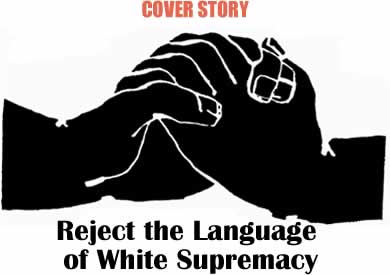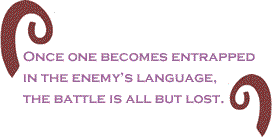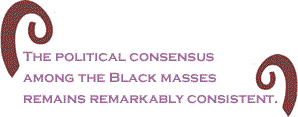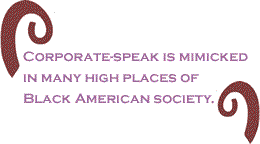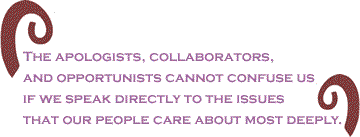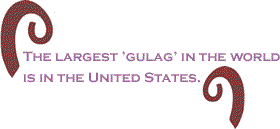
|
|||||||||||||||||||||
|
|
As we move toward an historic national Black convention in the first quarter of 2006 – “Going back to Gary,” as convener William Lucy, President of the Coalition of Black Trade Unionists phrased it, referring to the 1972 National Black Political Convention in that Indiana city – it is imperative that we reexamine the language of our political discourse. Otherwise, we will wind up talking nonsense – or worse, speaking against our own interests. In the 33 years since the Gary convention, corporate-speak has become ever more deeply embedded in the national conversation, reflecting the assumptions and aspirations of the very rich, who have vastly increased and concentrated their power over civil society. This alien language saturates the political culture via corporate media of all kinds, insidiously defining the parameters of discussion. Once one becomes entrapped in the value-laden matrix of the enemy’s language, the battle is all but lost. We cannot strategize ourselves out of the racist-corporate coil while ensnared in the enemy’s carefully crafted definitions and points of reference. “Going back to Gary” must mean going back to straight talk, from the African American perspective. The political consensus among the Black masses remains remarkably consistent, but has been relentlessly challenged since 1972 by 1) the rise of a small but vocal corporate class of African Americans who see their own fortunes as linked to larger corporate structures, and 2) aggressive corporate subsidization, beginning in the mid-Nineties, of a growing clique of Black politicians who define Black progress in terms of acceptance among rich, white people.
Thus, the internal contradictions in African American politics have greatly multiplied since Gary. This has not occurred because of increasing conservatism among a much enlarged Black middle class over the last three decades – a corporate-concocted slander for which there is no factual evidence – but by the determination of Big Money to impose an alternative leadership on the recalcitrant Black masses. Time for confrontation, not celebration The 1972 National Black Political Convention took place in an atmosphere of euphoria over the demise of Jim Crow, which unleashed the shackles of those Black social sectors that were prepared to take advantage of new opportunities, and empowered a new set of politicians who found themselves in majority Black jurisdictions. When the call to convention went out, everyone was welcomed, and as many as 5,000 showed up. Although much worthwhile political work was accomplished, the general atmosphere was celebratory. We were “Movin’ on Up” to “Celebrate Good Times.” Most believed there “Ain’t No Stoppin’ Us Now – We’re on the Move.”
Essentially, the Gary-era Black discussion centered on consolidation of the gains made during the previous civil rights decade. Short shrift was given to those who had called for deep structural change in the United States, whose demands (and often, lives) were snuffed out by U.S. police and intelligence agencies amidst the carnival of No-Mo’-Jim-Crow. There seemed to be great promise for Black America under a post-segregation regime – and certainly there was, for some. As long as that promise seemed attainable, demands for basic change in American (and world) power relationships were deemed by the upwardly mobile African American sectors as passé, distractions, quaint, but dated. This self-satisfied analysis was encouraged by a (mostly) white corporate class that harbored larger plans for total world domination: for the absolute, planetary rule of money. By the mid-Nineties, important elements of this class finally got over their reflexive racism – the aversion to sitting in a room with more than a few Black people – and invited some Black folks to join the club. In 1972, Black collaborators had to work hard to get paid even a pittance to advance the corporate agenda that is inextricably entwined with the ideology of White American Manifest Destiny. Today, they are actively solicited, and handsomely paid in monetary, media and political currency. Corporate-speak is mimicked in many high places of Black American society. For example, corporations dominated the leadership-selection process of our largest mass organization, the NAACP. Corporations have always had a special place in the National Urban League. Corporate influence has reached unprecedented levels among members of the Congressional Black Caucus – while most members stand firm with the historical Black Consensus. And corporations have created out of whole cloth a number of purportedly “Black” organizations, such as the Black Alliance for Educational Options (BAEO), which serve the interests of Wal-Mart and the rightwing Bradley Foundation – and are now also subsidized by the Bush regime. Under Bush, the Black clergy have been subjected to wholesale cooptation, through the Bradley Foundation-invented Faith Based Initiatives bribery schemes. This massive subornation of a critical Black institution resulted in only a net two percent change in Black party affiliation – from nine percent to eleven percent Black GOP voters in 2004. The base remains steadfast, but the leadership institutions have been infected by corporate and Republican money. Even so, the major Black Baptist denominations this year reaffirmed their allegiance to the “social gospel” that is our proudest legacy, and has generated and encouraged so many other movements that have pushed the envelope of civilization. Who, then, should be welcomed to the next “Gary” convention, tentatively scheduled for March, 2006? Everyone, just as in 1972.
It is the job of the conveners and organizers of the next National Black Political Convention to set the terms of the Great Black Debate. In large part, this is a function of language – to craft a language that is not infested with assumptions born of white privilege, imperialism, war-mongering, and anti-social ideology. In other words: Let’s talk Black. Among our own people, that kind of conversation wins the day, every time. Amen. The apologists, collaborators, and opportunists cannot confuse us if we speak directly to the issues that our people care about most deeply. Let the turncoats come – and be exposed. Some may even be saved. No rule of law? It is at times of crisis that precise language becomes most important. The Bush regime has plunged the entire planet into crisis – their grotesque version of globalization. While serving as White House counsel, the current Attorney General of the United States, Alberto Gonzalez, derided the Geneva Convention – the basis of international law, and codified as U.S. law – as “quaint.” The 2002 Gonzalez memo signaled that the regime was preparing to launch, not a War on Terror, but a war against world order, and against the rule of law within U.S. borders. We must reject his proclamation, in precise language that affirms the magnificent wording of the Geneva Convention, which outlaws aggressive war and upholds the right of all peoples to self-determination. That means get out of Iraq now, and no further threats to the independence and self-determination of other nations.
Black America is the firmest national constituency for peace, having opposed U.S. adventures abroad in greater proportions than any other ethnic group. We arrived at this more civilized state of being through our own gory experience of White American Manifest Destiny, which declared that a Black person has no rights “that a white man is bound to respect.” George Bush is acting out this vicious dictum on a global scale, and we know it. Therefore, we must tell the truth, as the masses of Black folks understand it: the United States is an aggressor nation in the world, and we demand that it cease, immediately. The problem in Iraq is not U.S. casualties, which are the result of George Bush’s crimes, but the predicate crime of U.S. aggression, a violation of international law. Mass Incarceration is Genocide Black America has always stood for the rule of law, despite the fact that American law has so often ruled against us. It does so every day, in vast disproportion to the anti-social behavior of some African American individuals. Guantanamo Bay is, indeed, part of an international “gulag” of American prisons, dotting the globe, as Amnesty International has declared. But the largest “gulag” in the world is in the United States – half Black and only 30 percent white, in a 70 percent white country. Fully one out of eight incarcerated human beings on earth are African American, the casualties of an internal war that has not ceased since the Euro-American aggressions against Africa. Rather, it escalates. At our next grand convention, we must state in no uncertain terms that the real crime wave is being committed against us by all levels of U.S. governments, which have placed Black people under surveillance for the purpose of incarcerating them, and devised laws that impact most heavily on our communities. Mass Black incarceration is a legacy of slavery and, therefore, a form of genocide. “We Charge Genocide,” again – because our social structures are being deliberately destroyed through government policy. Our language must make that plain.
This language is not meant for the oppressors’ ears, but for those of our own people. Black conventions are meant to mobilize Black people. Others are invited to take note. Our object is to galvanize African Americans to take action. Our history tells us that others follow our lead. Therefore, as a people that believe in the oneness of humanity, we are obligated to lead. We must reject the entire edifice of language that justifies a U.S. war machine that costs more than all the rest of the world’s militaries, combined, and then claims there is no money for the people’s welfare. We know where the money is: it is engaged in criminal, global corporate enterprises, such as war. We demand these enterprises cease, and that the national treasure be redirected to domestic concerns, and to righting the wrongs that the oppressors have inflicted on humanity throughout the planet – including the wrongs committed against Black people in the United States. We must not argue on corporate terms, about the “affordability” of national health insurance, or housing. We have a right to life, and to live somewhere. There will be no negotiation. Human rights trump property rights and corporate rights and warmonger rights. State it clearly. A real social contract Corporate politicians and media deploy the code words of “working people” and “middle class” to mean “white people” as the “deserving” members of the national community. We must reject such language, which is intended to exclude all Black people, including those who work, but explicitly dismisses the unemployed. We must not accept that corporate decisions to eject or bar people from the workplace, should have moral authority or political effect. All citizens have a right to live a decent life. We must demand a national minimum income, in addition to living wage standards. The cost of the Iraq war and related U.S. military deployments would finance a fundamental change in the average American’s life expectations – and life span. Nobody needs such a change more than Black folks. The rich can afford it. We need to say so, and dare the rich to go to some other country with their money. Nobody else wants them, and nobody else will fund their military, which is the savior of their holdings.
We must directly confront the idea – the unquestioned Holy Grail of corporate politicians and media – that corporations have the rights of citizens. Black and brown metropolises (the top 100 largest U.S. cities have non-white majorities) are at the mercy of corporate barons who shape the urban landscape to fit their profit-driven needs. Inevitably, they move in white people, the process that we call “gentrification.” This process is mostly unchallenged, yet it decides where Black people will live and work, and whether we will preserve the majorities that allow us to even contemplate meaningful democracy in urban America. While we are still majorities in these places, we must take action to exercise the powers that cities possess, in the service of our people. There must be a movement for Democratic Development – development that serves the people who already live in the city. This is perhaps the greatest challenge that faces the next National Black Convention because, if it turns out anything like Gary, in 1972, there will be plenty of Black politicians in attendance who have not done a damn thing to preserve the assets of the cities they nominally oversee, or to protect their own electorate from being displaced by corporate power. So be it. We must tell the truth, because our people are in crisis. There is no solving the problem of urban education, unless we can force the sharing of education funds. White people in the mass have shown over the last four decades that they will not share classrooms with us. But they must share the money, to correct the gross disparity between suburban and urban schools. Integration is not a one-way street, but citizenship is a shared status. We must state clearly that we are entitled to equal funding – that is, funding adequate for a white suburban district, and additional monies to deal with problems that suburbs don’t have. There are many other issues that must be tackled as we struggle to escape the Race to the Bottom that has been initiated by multinational corporations, and is politically empowered by the historical racism of white Americans, and made lethal by the military power of the U.S. state. The conveners of the next Black Political Convention should keep the agenda as efficient as possible, knowing that our assembled folks will add a plethora of resolutions. But keep our eyes on the prize. Black folks understand racism, but the whole world is getting an education in unbridled corporate behavior, that leads to famine, wars, and the dismantling of social services worldwide – including the United States, which is intentionally being made to fail as a society.
In the current configuration, globalization means corporate rule – by the gun, if necessary. Privatization is part and parcel of the deal, a divvying up of the spoils. National rights and the rights of minorities are all subservient to the rights of capital. Voting rights go down the toilet. We must teach a lesson in resistance, and give guidance to action – for our own people, and to those who look to us for leadership in the desert that is the United States. If we are to Speak Truth to Power, we must aim our words with precision. Black knowledge as a weapon The Coalition of Black Trade Unionists is ideal for the mission that faces us, since Black unionists have an intimate understanding of both corporate ruthlessness and the racist machinations that white privilege has found so successful through centuries of plunder and rule. Black unionists know the animal up close, and have smelled his foul breath. They also know the weaknesses of white co-unionists, who are quick to claim white privilege and abandon class solidarity. These are lessons learned painfully – but become weapons in the hands of those committed to struggle. We must not accept the legitimacy of the current rulers of the United States. They are thieves: stealers of elections; of the bodies of a million imprisoned African Americans; of the minds that are enfeebled by their corporate media; of the countries that they treat as plantations, and feel they can invade at will; and thieves of the productive capacity of the world, which grows every year, but fills only their own bank accounts.
The predatory lenders of the United States have stolen a half trillion dollars from the pockets of African Americans, according to anti-racist reporter Tim Wise. They have also stolen whole continents, and converted their populations into low-wage slaves whose labor is used as a weapon against workers of the United States, including the dwindling number of Black workers fortunate enough to have jobs. The global tentacles of multinational corporations are not a logical consequence of human civilization, but a construction of predators, whom we know all too well. It is our task to uphold civilization, against the corporate machine that would crush all humans underfoot. We know the feeling. We’ve been crushed before, and reel from the butt of the gun. But still we rise, to indict the criminals. And we, alone, have a constituency that is ready to march – if we tell them where and why to go. Let us choose our words carefully. Reaffirm the Black Consensus We are not looking for drama, but for clarity. The corporations and their war machines are providing the drama. A nation and world in crisis need clarity. Black America retains the power to speak, in the terms of our elders who identified with – and were – the Wretched of the Earth. On this coming Fourth of July, remember the words of Frederick Douglass, our greatest thinker and leader of the 19th Century, who spoke in the darkest hours of our people’s oppression, in 1852:
Frederick Douglass’s words were not popular with his white audience, but they buoyed the spirits of a people seeking freedom. They resonate with us now, when the “character and conduct of this nation never looked blacker.” We can end this madness, but not without great exercise of discipline, and the precise use of language. Much of it has already been written. But we must write the next version of our destiny…and act on it. Glen Ford and Peter Gamble, Co-Publishers of BlackCommentator.com, are writing a book on Barack Obama and the Crisis in Black Leadership. |
Your comments are always welcome. Visit the Contact Us page to send e-Mail or Feedback or Click here to send e-Mail to [email protected] e-Mail re-print notice
If you send us an e-Mail message we may publish all or part of it, unless you tell us it is not for publication. You may also request that we withhold your name. Thank you very much for your readership. |
| June 23 2005 Issue 143 |
|||||||||
|
|||||||||
|
|
|||||||||
| Printer Friendly Version | |||||||||
 |
|||||||||
 |
|||||||||
| |
|||||||||
| |
|||||||||





















